flat tire TOYOTA C-HR 2020 Warranties & Maintenance Guides (in English)
[x] Cancel search | Manufacturer: TOYOTA, Model Year: 2020, Model line: C-HR, Model: TOYOTA C-HR 2020Pages: 260, PDF Size: 8.54 MB
Page 84 of 260
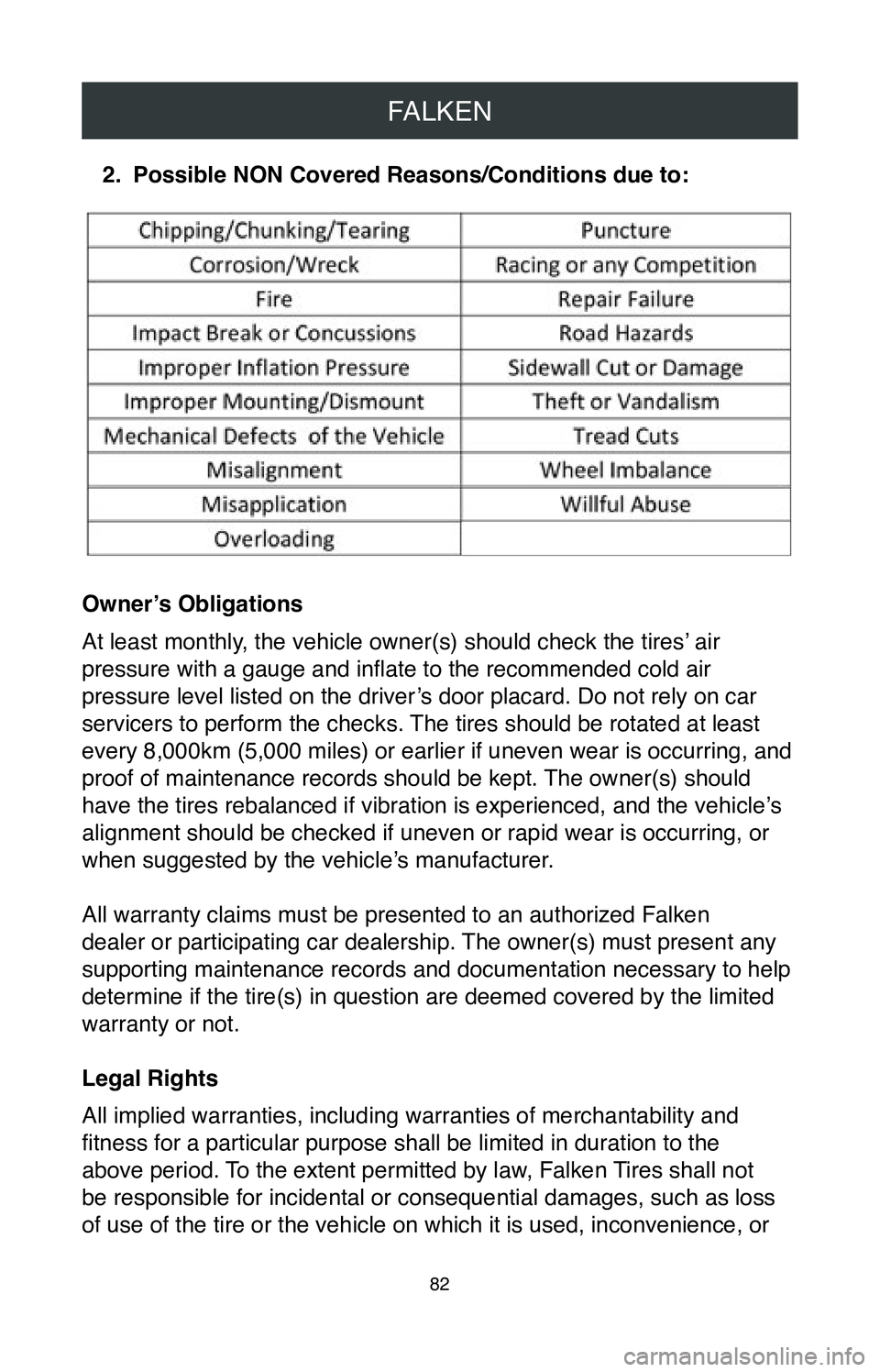
FALKEN
82
2. Possible NON Covered Reasons/Conditions due to:
Owner’s Obligations
At least monthly, the vehicle owner(s) should check the tires’ air
pressure with a gauge and inflate to the recommended cold air
pressure level listed on the driver’s door placard. Do not rely on car
servicers to perform the checks. The tires should be rotated at least
every 8,000km (5,000 miles) or earlier if uneven wear is occurring, and
proof of maintenance records should be kept. The owner(s) should
have the tires rebalanced if vibration is experienced, and the vehicle’s
alignment should be checked if uneven or rapid wear is occurring, or
when suggested by the vehicle’s manufacturer.
All warranty claims must be presented to an authorized Falken
dealer or participating car dealership. The owner(s) must present any
supporting maintenance records and documentation necessary to help
determine if the tire(s) in question are deemed covered by the limited
warranty or not.
Legal Rights
All implied warranties, including warranties of merchantability and
fitness for a particular purpose shall be limited in duration to the
above period. To the extent permitted by law, Falken Tires shall not
be responsible for incidental or consequential damages, such as loss
of use of the tire or the vehicle on which it is used, inconvenience, or\
Page 85 of 260
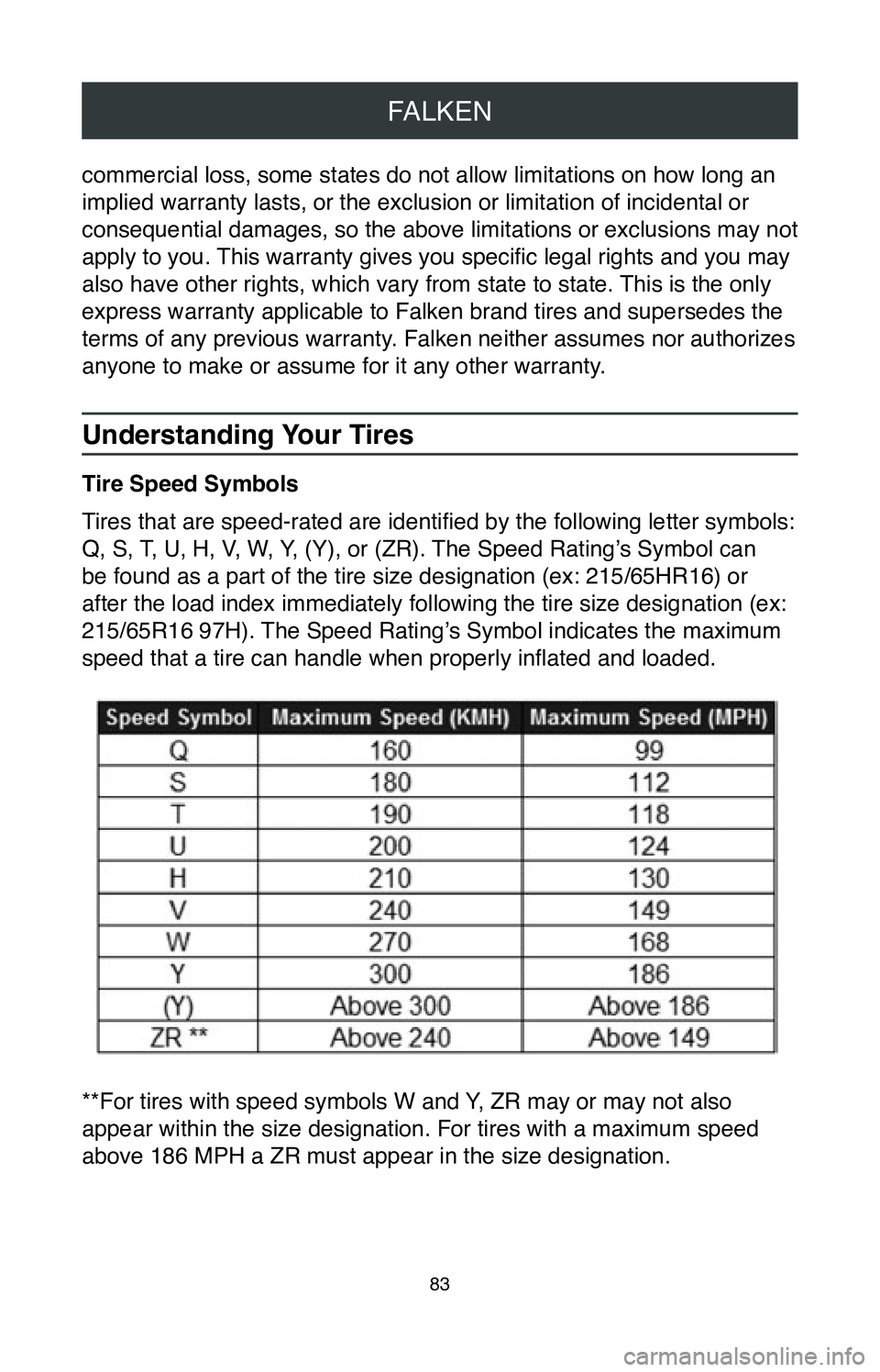
FALKEN
83
commercial loss, some states do not allow limitations on how long an
implied warranty lasts, or the exclusion or limitation of incidental or \
consequential damages, so the above limitations or exclusions may not
apply to you. This warranty gives you specific legal rights and you may
also have other rights, which vary from state to state. This is the only
express warranty applicable to Falken brand tires and supersedes the
terms of any previous warranty. Falken neither assumes nor authorizes
anyone to make or assume for it any other warranty.
Understanding Your Tires
Tire Speed Symbols
Tires that are speed-rated are identified by the following letter symbols:
Q, S, T, U, H, V, W, Y, (Y), or (ZR). The Speed Rating’s Symbol can
be found as a part of the tire size designation (ex: 215/65HR16) or
after the load index immediately following the tire size designation (ex:
215/65R16 97H). The Speed Rating’s Symbol indicates the maximum
speed that a tire can handle when properly inflated and loaded.
**For tires with speed symbols W and Y, ZR may or may not also
appear within the size designation. For tires with a maximum speed
above 186 MPH a ZR must appear in the size designation.
Page 87 of 260
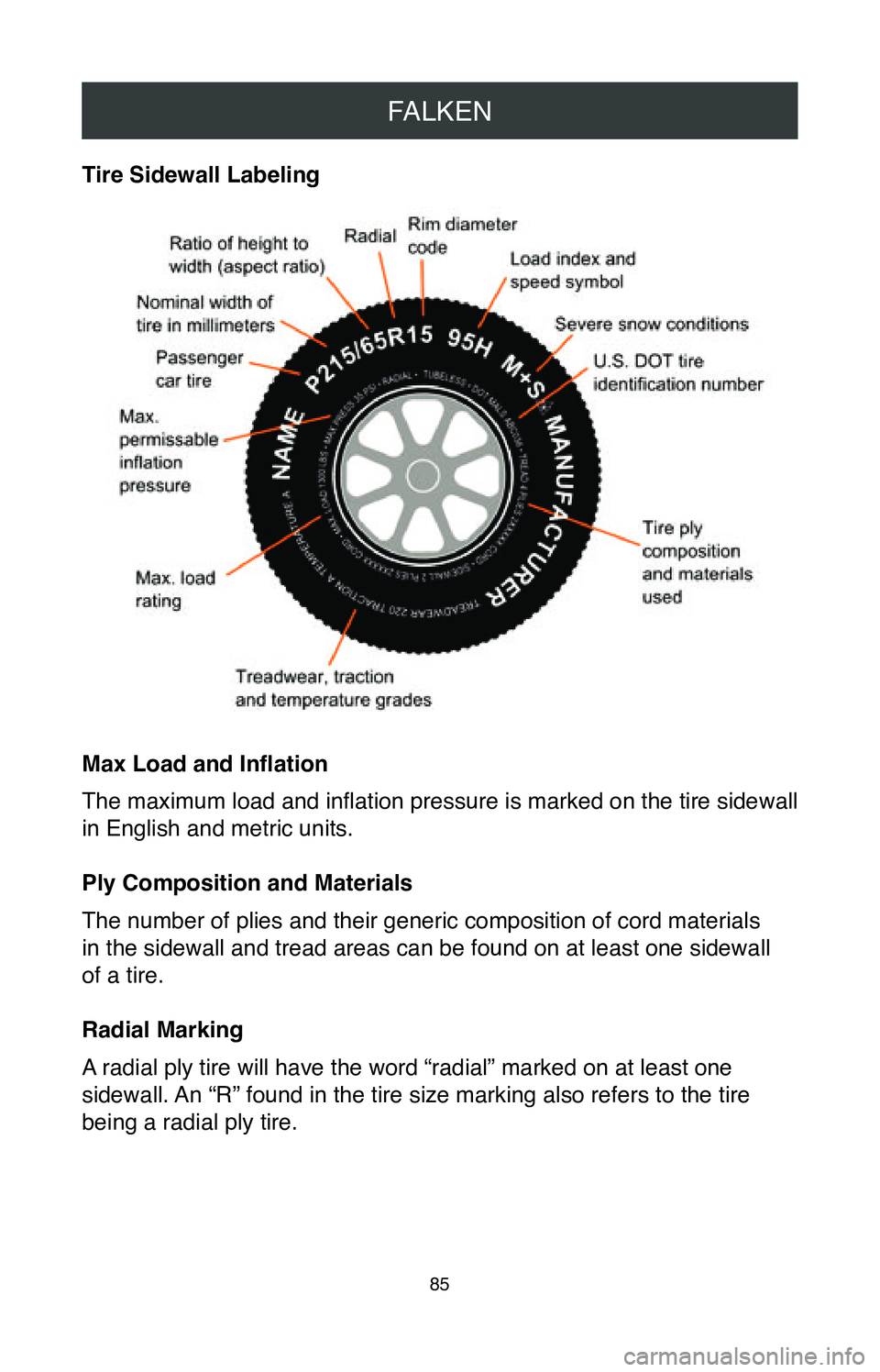
FALKEN
85
Tire Sidewall Labeling
Max Load and Inflation
The maximum load and inflation pressure is marked on the tire sidewall
in English and metric units.
Ply Composition and Materials
The number of plies and their generic composition of cord materials
in the sidewall and tread areas can be found on at least one sidewall
of a tire.
Radial Marking
A radial ply tire will have the word “radial” marked on at least on\
e
sidewall. An “R” found in the tire size marking also refers to the tire
being a radial ply tire.
Page 89 of 260
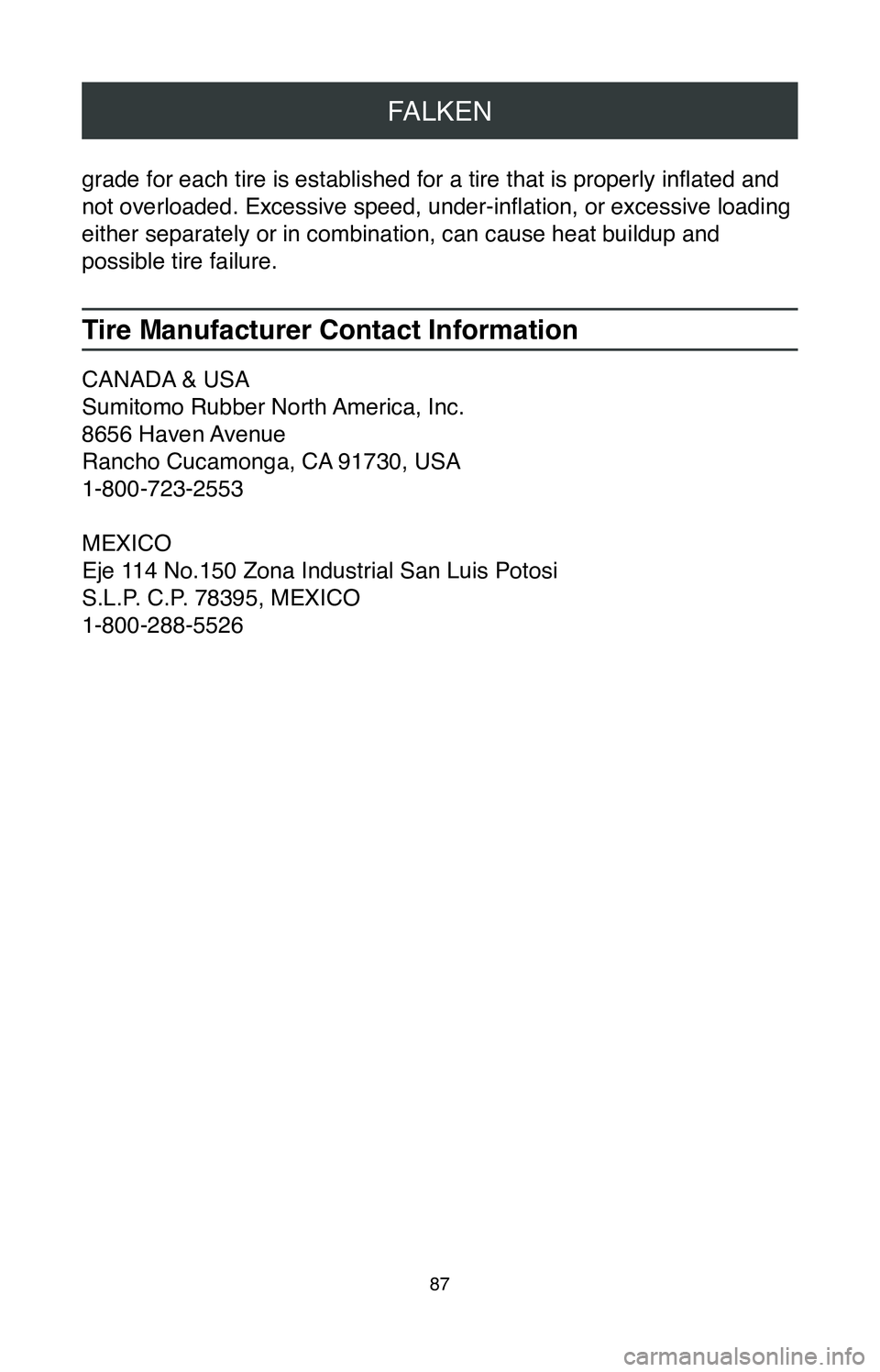
FALKEN
87
grade for each tire is established for a tire that is properly inflated and
not overloaded. Excessive speed, under-inflation, or excessive loading
either separately or in combination, can cause heat buildup and
possible tire failure.
Tire Manufacturer Contact Information
CANADA & USA
Sumitomo Rubber North America, Inc.
8656 Haven Avenue
Rancho Cucamonga, CA 91730, USA
1-800-723-2553
MEXICO
Eje 114 No.150 Zona Industrial San Luis Potosi
S.L.P. C.P. 78395, MEXICO
1-800-288-5526
Page 92 of 260

GOODYEAR / DUNLOP
90
tire at the time of adjustment. If the price of the comparable tire is
$400.00, the cost to you would be $200.00 plus Federal Excise Tax
(U.S. only), mounting, balancing, any other applicable taxes and
government- mandated charges.
(Plus FET [U.S. only], other applicable taxes, government- mandated
charges and mounting and balancing.)
What Is a Comparable Tire?
A “comparable” new Goodyear tire may be either the same line of
tire or, in the event that the same tire is not available, a tire of the
same basic construction and quality with a different sidewall or tread
configuration. If a higher priced tire is accepted as replacement, the
difference in price will be at an additional charge to you.
Any replacement tire provided pursuant to this warranty will be covered \
by the Goodyear warranty in effect at the time of replacement.
What Is Not Covered Under This Limited Warranty?
• Wear conditions or tire damage due to road hazards (including
punctures, cuts, snags, impact breaks, etc.). Wreck, collision, or
fire. Fast wear, irregular wear, heel and toe wear or other wear
conditions.
•
Improper inflation, overloading, high-speed spinup, misapplication,
misuse, negligence, racing, chain damage, or improper mounting
or demounting.
•
Mechanical condition of the vehicle.
•
Chip/chunk conditions on tires intended for highway service.
•
Ride disturbance after the first 2/32” (inch) treadwear or due to
damaged wheels or any vehicle condition.
•
Any tire intentionally altered after leaving a factory producing
Page 97 of 260

GOODYEAR / DUNLOP
95
OR FITNESS FOR A PARTICULAR PURPOSE, AND NO OTHER
WARRANTY OR REPRESENTATION OF ANY KIND IS MADE BY
GOODYEAR OR SHALL BE IMPLIED BY LAW.
LIMITATION OF DAMAGES: IN NO EVENT AND UNDER NO
CIRCUMSTANCE SHALL GOODYEAR BE LIABLE TO THE BUYER
FOR CONSEQUENTIAL, LOST PROFIT, LOSS OF BUSINESS, LOSS
OF GOODWILL OR REPUTATION, PUNITIVE OR OTHER DAMAGE,
COST (INCLUDING FOR REPLACEMENT TRANSPORTATION),
EXPENSE OR LOSS OF ANY KIND. SOME STATES DO NOT
ALLOW THE EXCLUSION OR LIMITATION OF INCIDENTAL OR
CONSEQUENTIAL DAMAGES, SO THE ABOVE LIMITATION OR
EXCLUSION MAY NOT APPLY TO YOU.
Note: No Representative or Dealer has authority to make any
representation, promise or agreement on behalf of Goodyear except
as stated herein. Any tire, no matter how well constructed, may fail in
service or otherwise become unserviceable due to conditions beyond
the control of the manufacturer. Under no circumstances is this
warranty a representation that a tire failure cannot occur.
Serious Injury, Death or Property Damage May
Result From
• TIRE FAILURE DUE TO UNDERINFLATION/OVERLOADING/
MISAPPLICATION. Follow the vehicle owner’s manual or tire
placard in the vehicle.
•
TIRE FAILURE DUE TO IMPACT DAMAGE/IMPROPER
MAINTENANCE. Tires should be inspected regularly by a qualified
technician for signs of damage, such as punctures or impacts.
•
TIRE FAILURE DUE TO IMPROPER REPAIRS. See U.S. Tire
Manufacturers Association established repair procedures at
www.ustires.org, and/or go to www.goodyear.com for information
on proper repair procedures.
•
EXPLOSION OF TIRE/RIM ASSEMBLY DUE TO IMPROPER
MOUNTING. Only specially trained persons should mount tires.
When mounting tires, use a safety cage and a clip-on extension air
hose to inflate.
Page 98 of 260
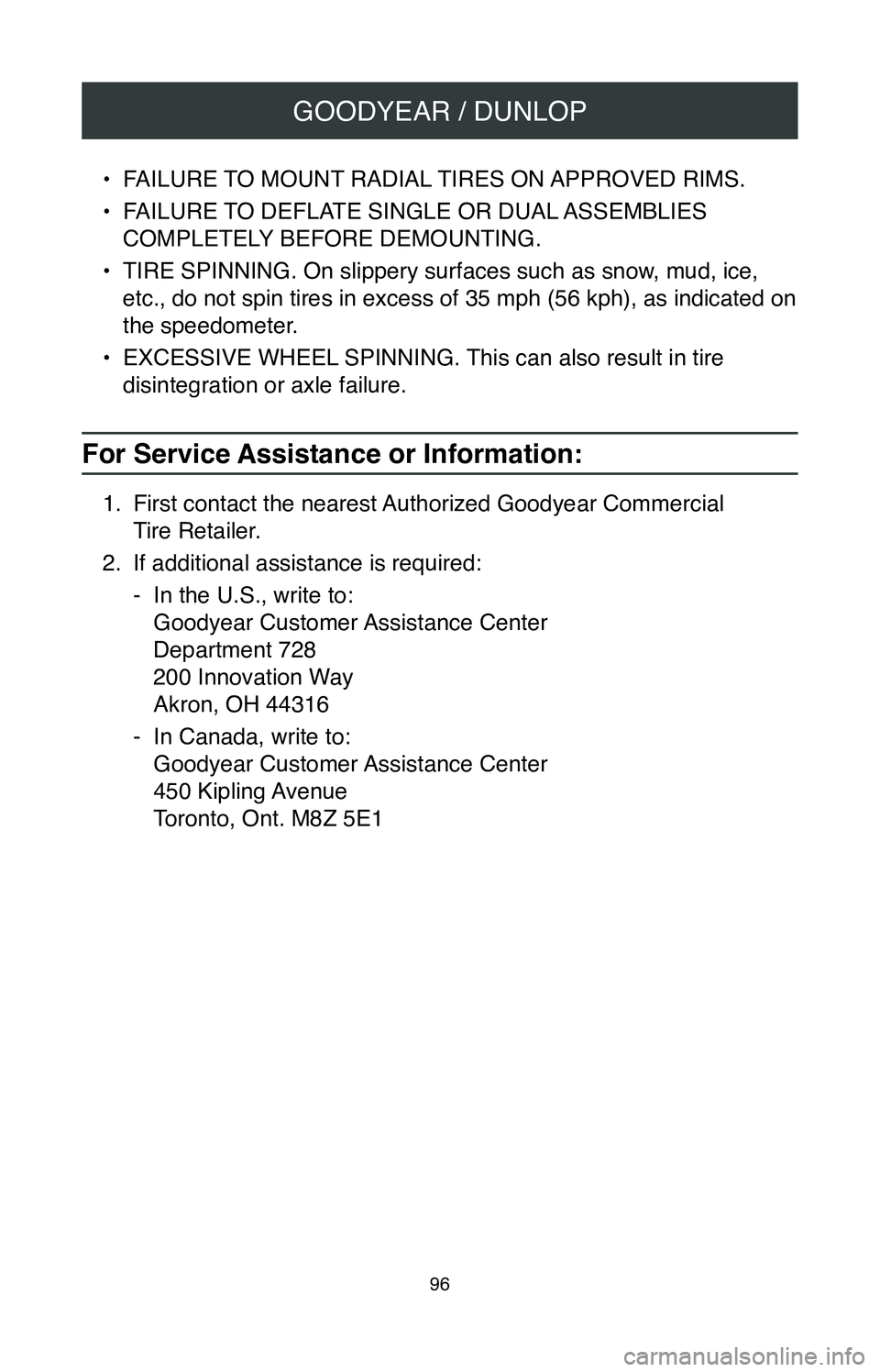
GOODYEAR / DUNLOP
96
• FAILURE TO MOUNT RADIAL TIRES ON APPROVED RIMS.
•
FAILURE TO DEFLATE SINGLE OR DUAL ASSEMBLIES
COMPLETELY BEFORE DEMOUNTING.
•
TIRE SPINNING. On slippery surfaces such as snow, mud, ice,
etc., do not spin tires in excess of 35 mph (56 kph), as indicated on
the speedometer.
•
EXCESSIVE WHEEL SPINNING. This can also result in tire
disintegration or axle failure.
For Service Assistance or Information:
1. First contact the nearest Authorized Goodyear Commercial
Tire Retailer.
2.
If additional assistance is required:
- In the U.S., write to:
Goodyear Customer Assistance Center
Department 728
200 Innovation Way
Akron, OH 44316
-In Canada, write to:
Goodyear Customer Assistance Center
450 Kipling Avenue
Toronto, Ont. M8Z 5E1
Page 100 of 260

HANKOOK TIRE
98
including mounting charge. No adjustment will be made for tires
that are worn more than 50%.
What Is Not Covered by the Warranty
Non Adjustable Conditionsa.
Irregular wear or tire damage due to: Road hazards such as
punctures, cuts, snags, scuffs, carcass bruises or impact breaks.
-Fire, wreck or collision
- Improper inflation, overloading, high speed spinning, improper
mounting or demounting, running flat, off-road use, racing,
vandalism, willful damage or abuse.
-Misalignment, wheel imbalance, defective brakes or shock
absorber, use of tire chains.
- Any tire which has failed as a result of adding materials (e.g. tire
fillers, sealant, or balancing substances).
-Mechanical failure or design of vehicle.
b.
Tires fitted to anything other than the original vehicles.
c.
Tire worn beyond tread wear indicator (2/32nds inch or 1.6mm
tread remaining).
d.
Tire presented by other than the actual owner-user.
e.
Tire branded “NA” (meaning no adjustment) or “blem” (meaning
blemished).
f.
Loss of time inconvenience, loss of use of the vehicle or
consequential damage.
g.
Ride disturbance caused by damaged wheels or after free-
replacement conditions.
h.
Tire with weather cracking which was purchased more than four
years prior to presentation for adjustment.
General Exclusions a.
No Hankook Tire employee, retailer or dealer has the authority
to make any warranty, representation, promise or agreement on
behalf of Hankook Tire except as stated in this policy.
b.
Tires used in racing related activities or competitive events are not
covered by this warranty.
Page 103 of 260
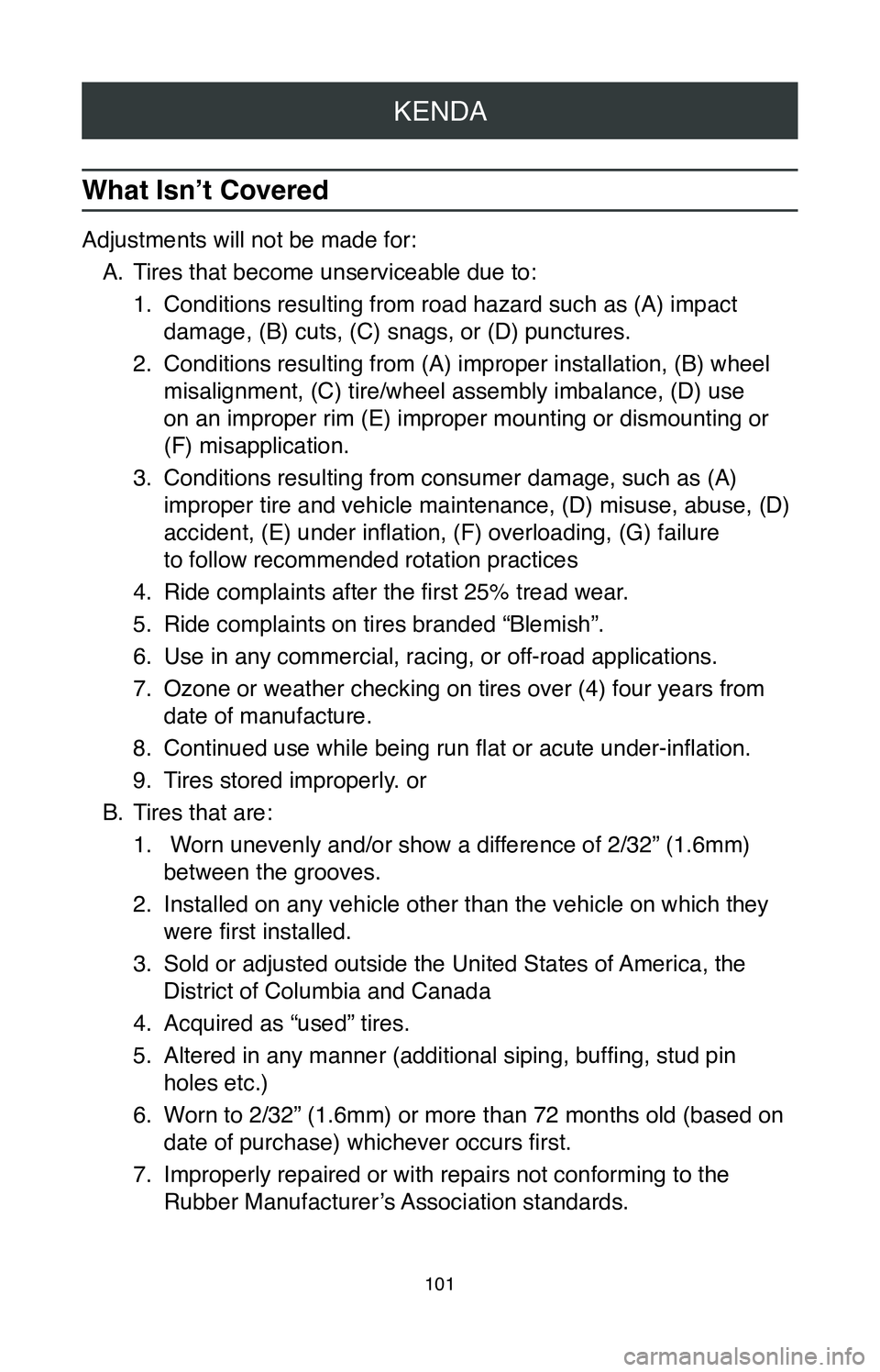
KENDA
101
What Isn’t Covered
Adjustments will not be made for:A.
Tires that become unserviceable due to:
1.
Conditions resulting from road hazard such as (A) impact
damage, (B) cuts, (C) snags, or (D) punctures.
2.
Conditions resulting from (A) improper installation, (B) wheel
misalignment, (C) tire/wheel assembly imbalance, (D) use
on an improper rim (E) improper mounting or dismounting or
(F) misapplication.
3.
Conditions resulting from consumer damage, such as (A)
improper tire and vehicle maintenance, (D) misuse, abuse, (D)
accident, (E) under inflation, (F) overloading, (G) failure
to follow recommended rotation practices
4.
Ride complaints after the first 25% tread wear.
5.
Ride complaints on tires branded “Blemish”.
6.
Use in any commercial, racing, or off-road applications.
7.
Ozone or weather checking on tires over (4) four years from
date of manufacture.
8.
Continued use while being run flat or acute under-inflation.
9.
Tires stored improperly. or
B.
Tires that are:
1.
Worn unevenly and/or show a difference of 2/32” (1.6mm)
between the grooves.
2.
Installed on any vehicle other than the vehicle on which they
were first installed.
3.
Sold or adjusted outside the United States of America, the
District of Columbia and Canada
4.
Acquired as “used” tires.
5.
Altered in any manner (additional siping, buffing, stud pin
holes etc.)
6.
Worn to 2/32” (1.6mm) or more than 72 months old (based on
date of purchase) whichever occurs first.
7.
Improperly repaired or with repairs not conforming to the
Rubber Manufacturer’s Association standards.
Page 105 of 260
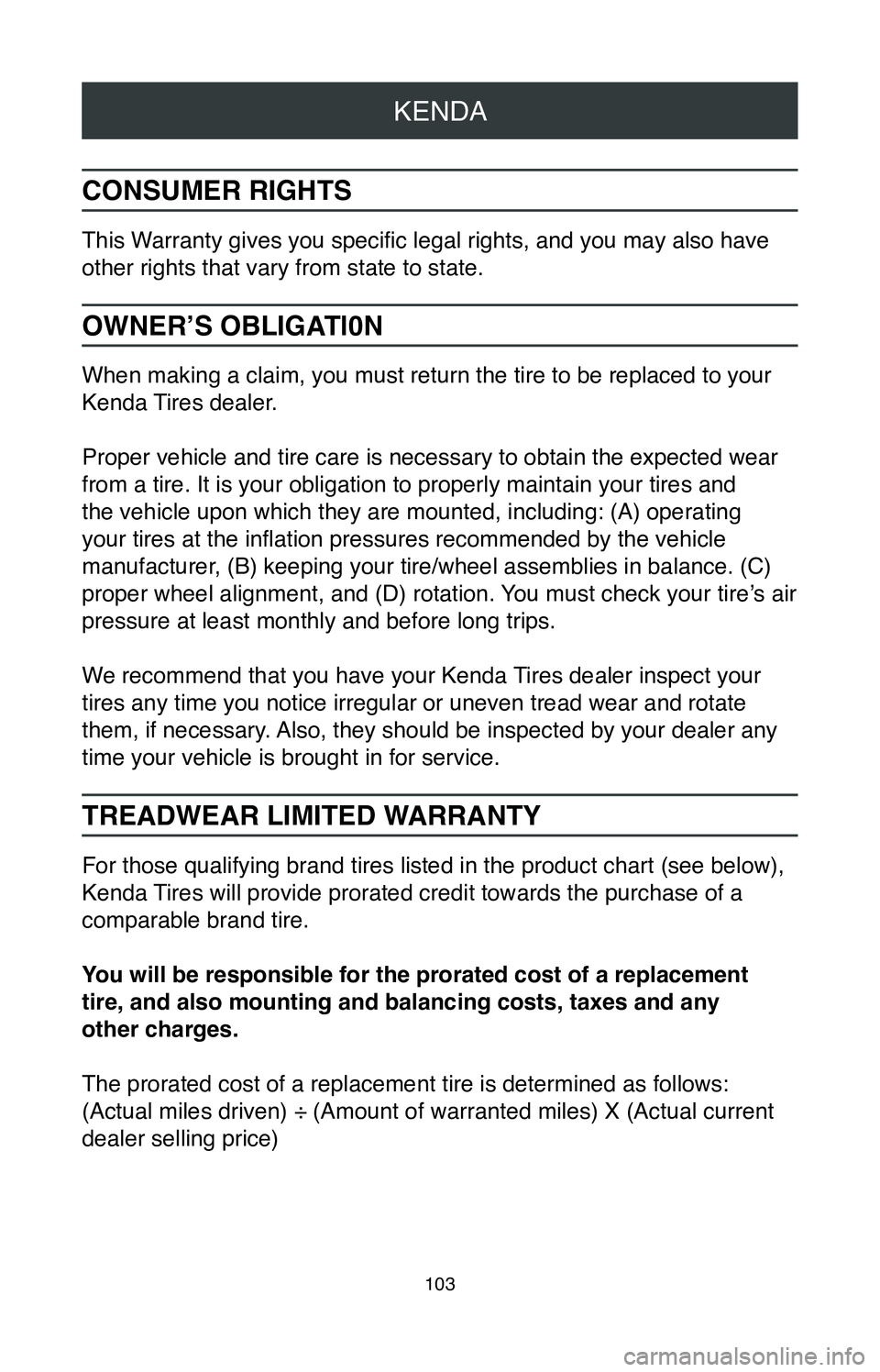
KENDA
103
CONSUMER RIGHTS
This Warranty gives you specific legal rights, and you may also have
other rights that vary from state to state.
OWNER’S OBLIGATl0N
When making a claim, you must return the tire to be replaced to your
Kenda Tires dealer.
Proper vehicle and tire care is necessary to obtain the expected wear
from a tire. It is your obligation to properly maintain your tires and
the vehicle upon which they are mounted, including: (A) operating
your tires at the inflation pressures recommended by the vehicle
manufacturer, (B) keeping your tire/wheel assemblies in balance. (C)
proper wheel alignment, and (D) rotation. You must check your tire’s air
pressure at least monthly and before long trips.
We recommend that you have your Kenda Tires dealer inspect your
tires any time you notice irregular or uneven tread wear and rotate
them, if necessary. Also, they should be inspected by your dealer any
time your vehicle is brought in for service.
TREADWEAR LIMITED WARRANTY
For those qualifying brand tires listed in the product chart (see below),
Kenda Tires will provide prorated credit towards the purchase of a
comparable brand tire.
You will be responsible for the prorated cost of a replacement
tire, and also mounting and balancing costs, taxes and any
other charges.
The prorated cost of a replacement tire is determined as follows:
(Actual miles driven) ÷ (Amount of warranted miles) X (Actual current
dealer selling price)